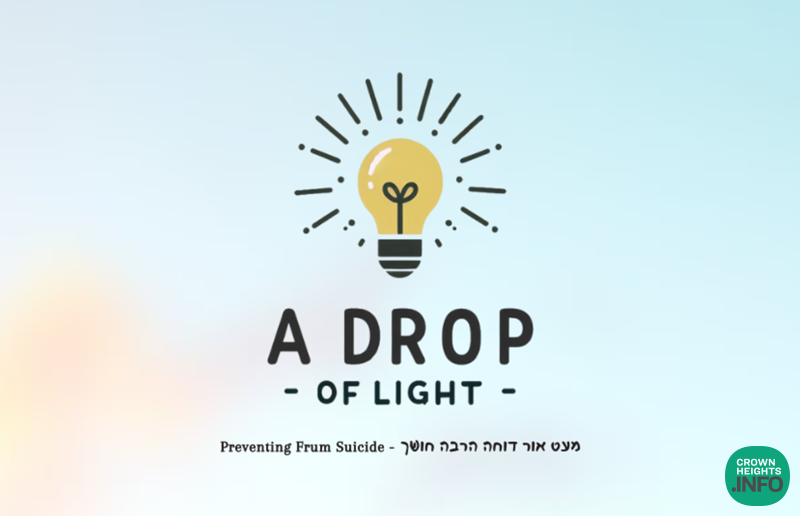
A Drop Of Light, Suicide Awareness and Prevention in the Frum Community
Suicide. Say the word out loud. Can’t do it? Many people, both in the world at large but even more so in the frum community find it difficult to say the word suicide, let alone discuss it. Even fewer people have the knowledge of the warning signs of suicidal ideation and how to broach the conversation with someone they are concerned about. And among those who themselves have been suicidal, it is a topic that is rarely mentioned outside of the therapist’s office for fear of being looked down on.
The first time Hadassah Zirkind was suicidal was excruciating. The scary reality of spending the night with the police and mobile crisis unit, the realization that life is so fleeting – it was all overwhelming. Like any Lubavitcher chossid would do, the next day, her husband sent a letter to the Ohel, begging the Rebbe to intercede and bentch Hadassah with a complete recovery.
After writing the letter, he opened the Igros and received an amazing answer. The letter, addressed to an individual battling with a medical condition, conveyed three main points: first, that the person should take medication; second, that the journey would be long and full of ups and downs; and third, that the individual should use their challenges to help others.”
This third point of using her challenges to help others became a mission statement. And so, A Drop of Light was born. The organization’s mission is to raise awareness of and prevent frum suicides. From dispelling common myths surrounding suicide, to providing information on both frum and national mental health organizations, as well as listing Rabbonim well-versed in the intersection of mental health and halacha, their website is a treasure trove of vital and potentially life-saving information.
As it currently stands, the taboo around suicide in our community leaves those who struggle feeling alone and unsupported; feelings which can lead to an increase in the probability of carrying out a suicide plan. There are few resources available for frum individuals who struggle. And the community at large is lacking basic and fundamental knowledge in this area.
Perhaps the most common myth surrounding suicide is that speaking about it will plant the idea in a person’s head. Research, however, has shown the exact opposite. According to the National Institute of Mental Health, asking someone directly if they are thinking of killing themselves can actually be the best way to identify if someone is at risk for suicide.
This also combats the misconception that people won’t honestly answer questions about how they are doing. In fact, if asked in a way which shows care, sensitivity, and openness, it is highly probable that the person who is struggling will be honest and open about that fact.
Let’s discuss Rabbonim for a moment. Rabbonim are a crucial part of life as a frum person. But if a Rav doesn’t have knowledge in the realm of mental health, their psak can be dangerous. Boruch Hashem, there are Rabbonim who have made the effort to learn about mental health and are therefore able to help. All of the Rabbonim listed on A Drop of Light’s website were vetted for their knowledge and sensitivity, and all of them agreed to be listed.
According to the World Health Organization (WHO), nearly 700,000 people worldwide die by suicide annually. It’s the second leading cause of death for individuals aged 15-24. With such statistics, it’s likely that you know someone who has contemplated taking their own life.
A Drop of Light aims to start the conversation around suicide. Without dialogue, there can be no change. And if there is no change, then the risk of losing loved ones to suicide remains all too real.
Whether you are looking for help for yourself or someone you love, or you are just trying to broaden your knowledge, A Drop of Light has invaluable information. So check out their website at preventfrumsuicide.org and save a life today.












Hatzalah member
Sadly, I’ve been on several calls that involved suicide. I think this is a very important and needed organization.
We need to stop the stigma of mental health illness and suicide. Mental health disorders are the same as any other disease. Kol HaKavod for starting this organization!
Does it work?
The world open to suicide deals with it much more then us. Medicine developed people started living longer. When people started “preventing” suicide it started happening more. So we want more of it, c”v? Beware of “problem solvers” making the problem worse. The west and its emptiness suffers from more suicide then any other culture. So we trust people educated by the problem makers to fix it?
Mendy Hecht
Just for everyone’s information, as a person who once intervened in someone’s threats of self-harm (don’t worry, he’s alive and well), I called a hotline and they said the best thing to tell a person threatening suicide is, “You have the right to harm yourself–but if you do, you’ll be hurting a lot of people who love you and whom you love.” I think it worked. Today he’s happily married.
Kreina Staal
It takes courage and determination to start such an initiative. Save a life and you save a world, I wish you only success.